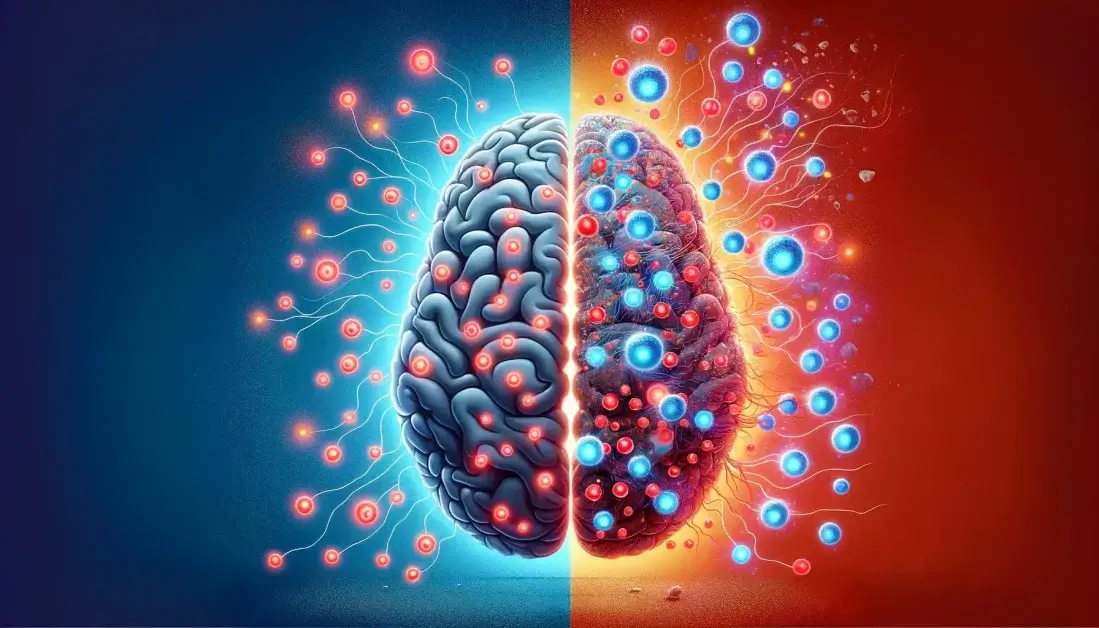
Serotonin Syndrome: Causes, Symptoms, and Treatment
Serotonin syndrome is a condition caused by excessive serotonin levels in the brain, triggered by excessive serotonin from drugs.
Key Points:
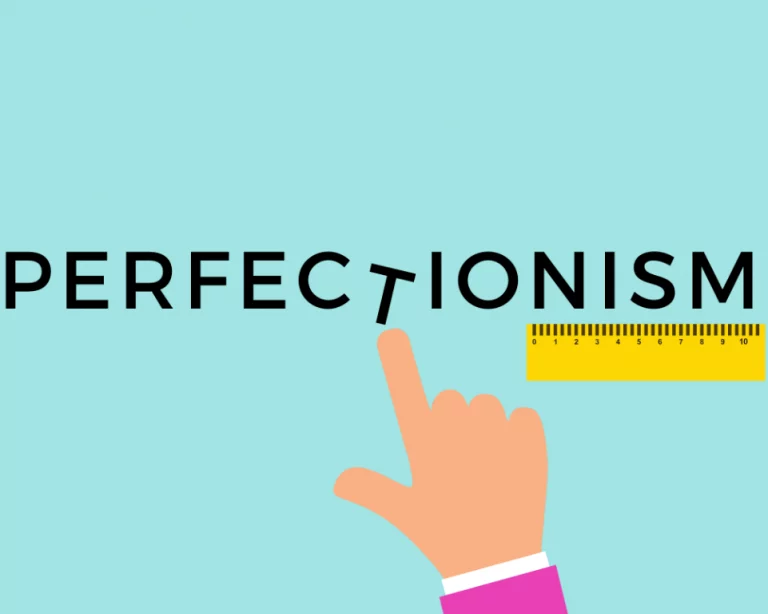
“What is your greatest weakness?”
If this is the world’s most tired job interview question, then the common answer, “perfectionism”, is surely the world’s most tired answer.
Like all victims of this precarious question, the answer is intended to signal that a person’s “flaws” are actually virtues. After all, perfectionists won’t stop until a job is done perfectly.
But the need to be perfect is often a major flaw. In fact, it is often one of the greatest barriers to “execution”, a term used by CEOs and business leaders to describe the ability to get something done.
In other words, perfectionism is the enemy of productivity.
In this article, we will see how perfectionists often cause themselves more harm than good, when and where perfectionism is useful, and, most importantly, when it most certainly is not.
Even if you don’t consider yourself a perfectionist, you will likely exhibit some similar tendencies, and therefore suffer from some of these same symptoms.
Perfectionism has many definitions and means different things to different people.
In a psychological sense, we can think of perfectionism as a disposition to regard anything short of perfection as unacceptable.
This manifests itself as the setting of unrealistically demanding goals and the failure to achieve them as unacceptable and a sign of personal worthlessness. It also often results in us feeling like a failure, even if there is no evidence to suggest so.
The need to do everything perfectly can stop us from doing things that are important to us because we’re afraid we won’t perform them flawlessly. This may seem like a non-issue for some, but for others, it can be extremely debilitating.
Perfectionists need to be or appear to be perfect. The problem is this is either impossible to achieve, or at least extremely difficult.
When running a hotel, for example, some guests will always find something to complain about, such as the lights being too bright.
So you buy some dimmer and lights hoping to eliminate the complaint, only for someone else to complain that the lights are not bright enough. When involving opinion, perfection is often impossible to achieve because it varies based on individual preferences.
In some areas, however, it is possible, such as copywriting, where their livelihood depends on consistently producing error-free texts.
But for the majority, perfectionism is often a trap because so much time and effort is wasted trying to achieve an impossible standard.
And worst of all, this unreasonable standard is self-imposed by our own minds. We suffer where we don’t need to purely because of the unnecessarily high standards we place upon ourselves. Crazy!
Research has identified two types of perfectionism.
The first, excellence-seeking perfectionism, defines those who demand and fixate on excessively high standards. This group is driven by holding both themselves and others to very high achievement standards based on performance. This is also frequently referred to as “adaptive” perfectionism.
The second type, failure-avoiding perfectionism, involves an obsessive concern with failing to achieve these high-performance standards. They are driven by a fear of not performing as opposed to a need to achieve a certain standard. This type of perfectionism is commonly referred to as “maladaptive”.
Failure-avoiding perfectionists are constantly worried their work is not good enough and believe that they will lose the respect of others if these high standards are not achieved.
While high standards and quality of work are important in most areas of life and careers, the obsession over them rarely is. And when these self-imposed high standards are near impossible to achieve, they can consume all reason and logic and leave nothing but stress and anxiety.
Of the two, the failure-avoiding group suffers from the negative effects to a greater degree.
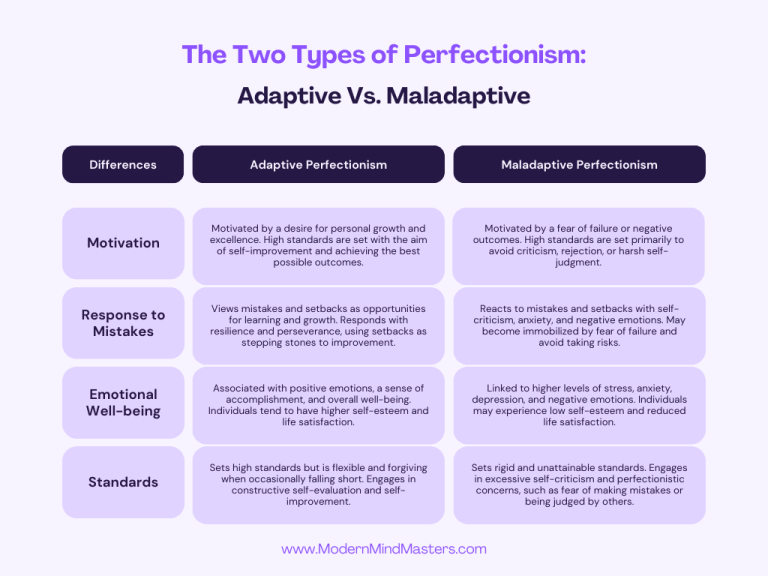
Perfectionism has many detrimental effects, from the subtle to the downright dangerous.
A big literature review in 2016 concluded that perfectionism is associated with a string of mental health disorders, from depression and burnout to stress and self-harm.
Below are three of the most serious consequences of perfectionism gone awry. If you consider yourself a perfectionist, make sure you keep a close eye out for them.
One consequence of perfectionism is procrastination – the arch enemy of productivity. The need for everything to be perfect, in a world that doesn’t require perfection, leads to wasted time and effort.
I am a big believer in the Pareto principle – that 80% of results come from 20% of input. For businesses, this might mean that 80% of profits come from 20% of products, or for meetings, 80% of action items are covered in 20% of the meeting length.
Perfectionists, however, spend most of their time doing the reverse – they spend 80% of their time achieving the final 20% of an activity. This is a wasteful use of time and places a self-imposed and unnecessary emotional burden on ourselves.
But worse than slow productivity is no productivity. Perfectionism, and the need to not be seen as failing to achieve, will instill a fear of failure that may prevent perfectionists from trying altogether.
Perfectionists are often under a lot of pressure, either from their own standards or perceived standards from others.
Over time these pressures will compound, causing elevated levels of stress. And stress is a catalyst for a whole host of very real and very dangerous symptoms.
Anxiety and depression are common, which can further develop into loneliness, impatience, frustration, anger, obsessiveness and compulsiveness, and even suicidal thoughts.
All of these symptoms will take a physical toll on the body; elevated levels of cortisol (a stress hormone) in the brain and body over a significant time leads to increased blood pressure, weight gain, muscle weakness, and weak bones.
You may also be more vulnerable to imposter syndrome — where you compare yourself to others and don’t feel like you’re meeting expectations, especially in regards to intelligence. The fear of “being found out” breeds anxiety, and is associated with elevated levels of cortisol in the brain and body.
Another consequence of perfectionism is strained relationships, including family, friends, and work colleagues. Perfectionists are also more likely to avoid making new relationships and networking for fear of failing to meet a person’s expectations.
Typically, when you have high standards for yourself, you also hold others, even those closest to you, to the same standards. And these standards are usually placed upon everybody – you typically can’t turn off this way of thinking for one group of people over another.
Eventually, this will strain both parties, damaging the relationship and further adding to the stresses perfectionists are already under.
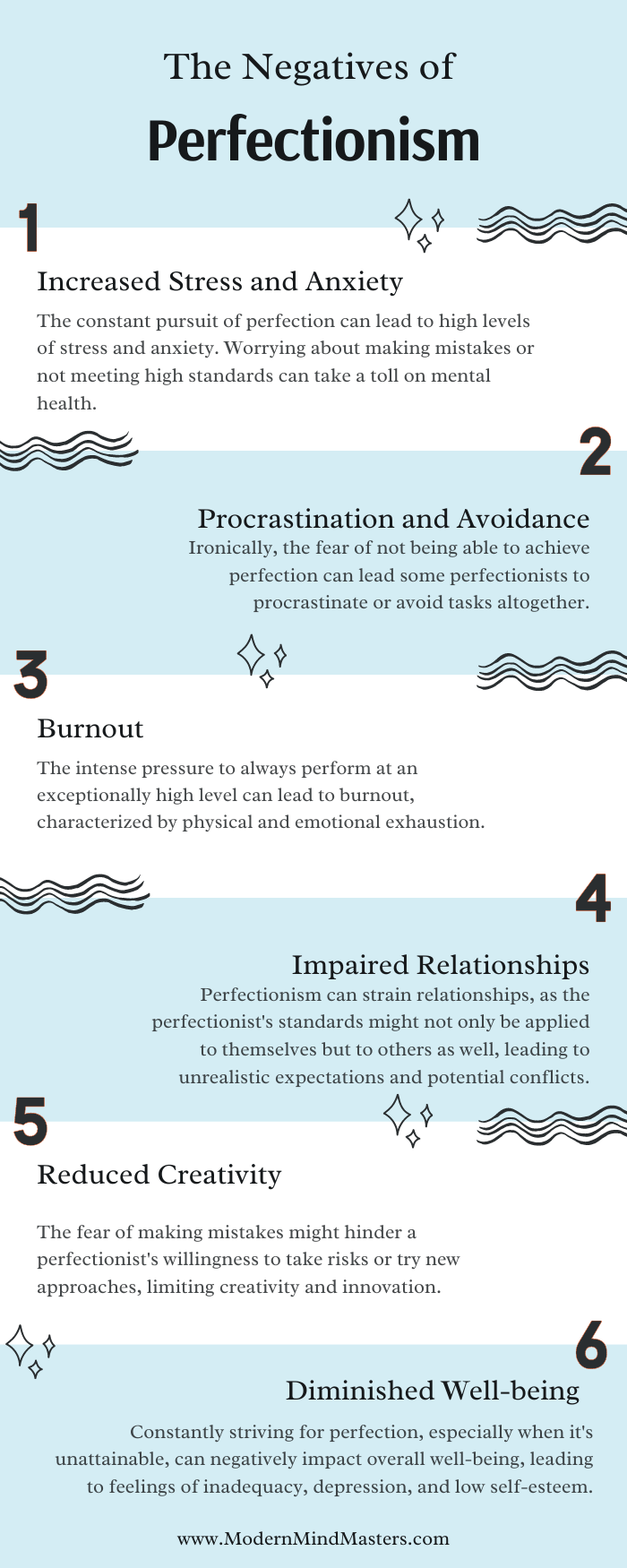
Even if you are a functional perfectionist – you can manage to sustain strong relationships and your health despite your standards – there is one consequence that is unavoidable and reaches into every aspect of your life. Perfectionism is inefficient. Period.
Perfectionism is a battle of diminishing returns. The closer you strive to perfection the more time is spent yielding fewer results.
Take writing this article for example. It may take me two hours to write a plan, research facts, and find supporting data. After two hours, it is 80% finished.
Now I have to re-read it and maybe rearrange a few sentences and do some grammar checks. This will take me to 95% finished. But whereas I spent two hours achieving 80% (or 40% per hour), I have now spent one hour furthering it by just 15% .
Finally, once everything is together, I do a final check, ensuring there are as few mistakes as possible. This takes another hour but only achieves a further 5% of the result to take me to 100% complete and ready to post.
From here I could spend another hour fine-tuning it further, maybe finding one or two sentences that can be altered slightly to improve the flow and engagement. This is certainly what a perfectionist would do.
But at this point, the ROI of my time is diminished.
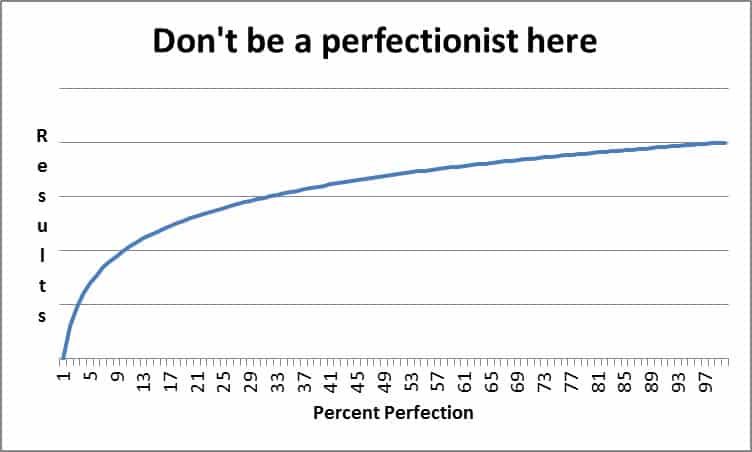
My intent with this article is to inform and enlighten. The meaning behind the words is the priority, so as long as the message is transferred, I am not too concerned with the finer details of grammar.
Perhaps you may have noticed one or two errors already? But had I spent time on my other articles making them perfect, I may not have had the time to write this article at all.
If I had paid a copywriter to check this article, however, I would expect perfection, but I am also paying them by the hour to achieve this level of quality.
We must learn when quality (and hence perfectionism) is appropriate, and when we simply just need to get something done.
To really drill this point, let’s see how it applies in the real world of business and entrepreneurship.
Entrepreneurship rarely has any place for perfectionism. In fact, of the 50% of businesses that fail within the first five years, I would attribute the majority of failures to lacking execution caused by a drive towards perfectionism.
This is best explained using the Minimum Viable Product concept, devised by Eric Ries in his legendary book The Lean Startup.
A minimum viable product is a version of a product with just enough features to be usable by early customers who can then provide feedback for future product development. A focus on releasing an MVP means that developers potentially avoid lengthy and unnecessary work.
The basic premise is that prototypes can be refined, pivoted, or even scrapped, based on feedback from early adopters.
Fussing about cosmetic details and nice-to-have functions is a waste of time. Instead of us spending time guessing what we believe the market will want, why not let the market tell you directly, through immediate customer feedback?
The essence of the MVP approach is anti-perfectionism: don’t procrastinate, don’t spend time sweating the tiniest details; get your product into the user’s hands, and see how it does.
It allows the development teams to collect the maximum amount of validated learning about customers with the least amount of effort.
The time spent creating the MVP is rewarded with the highest return on investment because you learn exactly what you need to do in the shortest amount of time while spending the least amount of money. This may sound lazy, or like a lack of quality, but it is all about efficiency.
In business, and in our personal lives, time is our most valuable resource. How efficient we are at spending our time, therefore, determines our output.
Take Airbnb, for example. With no money to build a business, the founders of Airbnb used their own apartment to validate their idea to create a market offering short-term, peer-to-peer rental housing online. They created a minimalist website, published photos and other details about their property, and found several paying guests almost immediately.
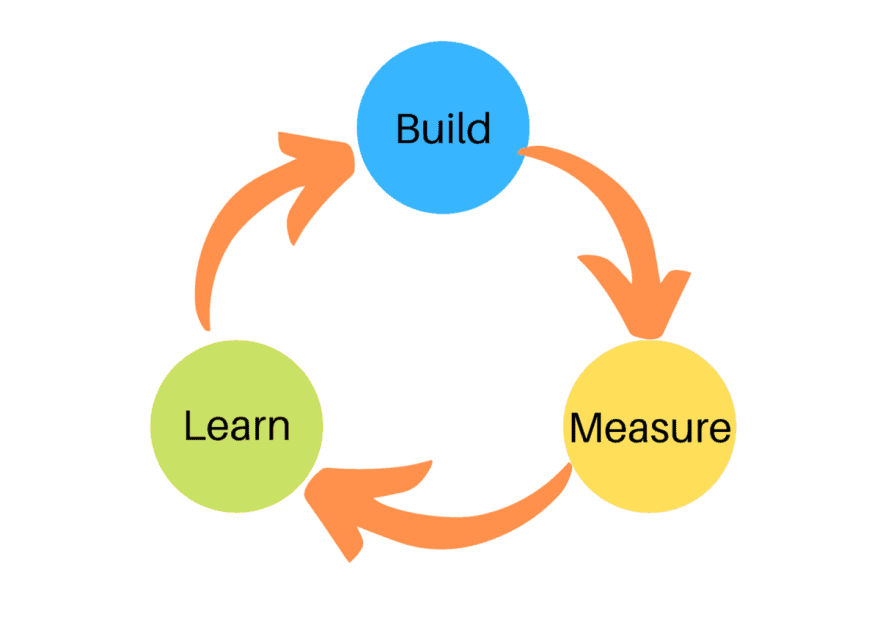
We have already mentioned that some tasks require a tickle of perfectionism. Copywriting and medical dispensaries are just a few fields where even small mistakes can have significant consequences.
Someone once bought up a fair comment that disagreed with this article. They told me that the “that’ll do” mantra was not what made Steve Jobs successful.
I have to admit, they had me. But the more I thought about it, the more I realized that although Steve Jobs certainly was a perfectionist to the highest degree, Apple was not.
Steve Jobs had a team of thousands all dedicating their careers to executing the details of his vision. Steve Jobs may have been a perfectionist, but his team was execution based, and this mix was what ultimately drove Apple’s dominant success.
The last misconception I want to clarify is that discouraging perfectionism does not mean sacrificing high standards.
In a paper published last year, three academics at the University of Ottawa found that people who strove for good scores tested better for creative thinking than those who sought perfection.
Those who try their best but treat failures as learning opportunities rather than indicators of inferiority are the kinds of people who achieve high standards of excellence without the consequences of perfectionism.
Failure is welcome when it results in learning.
Harvard Business Review’s study on the pros and cons of perfectionism showed that performance and perfectionism were not related to each other, i.e., perfectionists are not better or worse performers than non-perfectionists. Even employees high in excellence-seeking perfectionism were not found to be better performers.
Four decades of study on perfectionism were analyzed to test whether perfectionists perform better at work. A meta-analysis of 95 studies, conducted from the 1980s to today examining the relationship between perfectionism and factors that impact employees’ effectiveness found that perfectionism is a much bigger weakness than job applicants and interviewers probably assume.
Perfectionism has its place for a few niche roles, but for the majority, being a perfectionist does far more harm than good.
Always think about the aim of the task at hand, and evaluate the balance between quality and productivity.
Think lean. Identify the bare minimum you need to do to progress and do just that. You can always improve later once the need to do so has been identified, but to be efficient we need to yield the maximum result in as little time as possible.
So next time someone asks you for your biggest flaw in an interview, consider an answer other than being a perfectionist. To an employer who has done his homework, and understands the consequences perfectionism entails, it could cost you the job.
In a psychological sense, we can think of perfectionism as a disposition to regard anything short of perfection as unacceptable.
This manifests itself as the setting of unrealistically demanding goals and the failure to achieve them as unacceptable and a sign of personal worthlessness. It also often results in us feeling like a failure, even if there is no evidence to suggest so.
Harvard Business Review’s study on the pros and cons of perfectionism showed that performance and perfectionism were not related to each other, i.e., perfectionists are not better or worse performers than non-perfectionists. Even employees high in excellence-seeking perfectionism were not found to be better performers.
Perfectionism has its place for a few niche roles, but for the majority, being a perfectionist does far more harm than good.
Always think about the aim of the task at hand, and evaluate the balance between quality and productivity.

Serotonin syndrome is a condition caused by excessive serotonin levels in the brain, triggered by excessive serotonin from drugs.
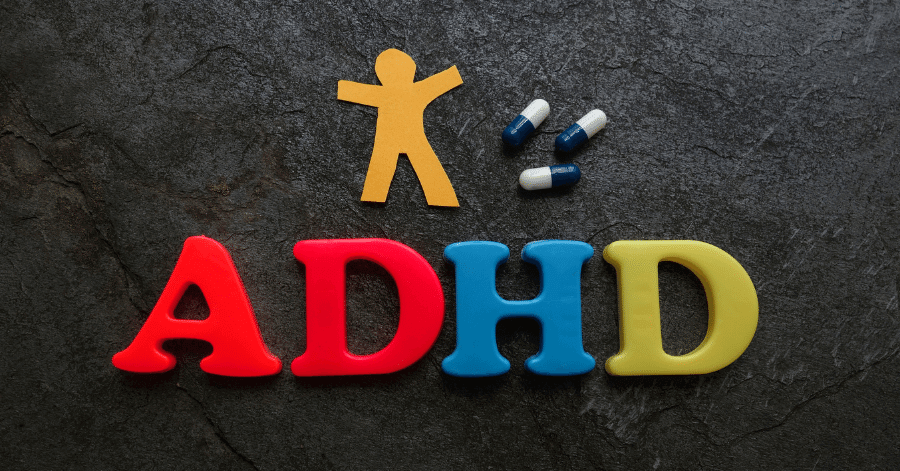
Treatments for ADHD include prescription medication, natural stimulants, natural non-stimulants, and non-invasive techniques. The best course of action, however, depends on the individual.
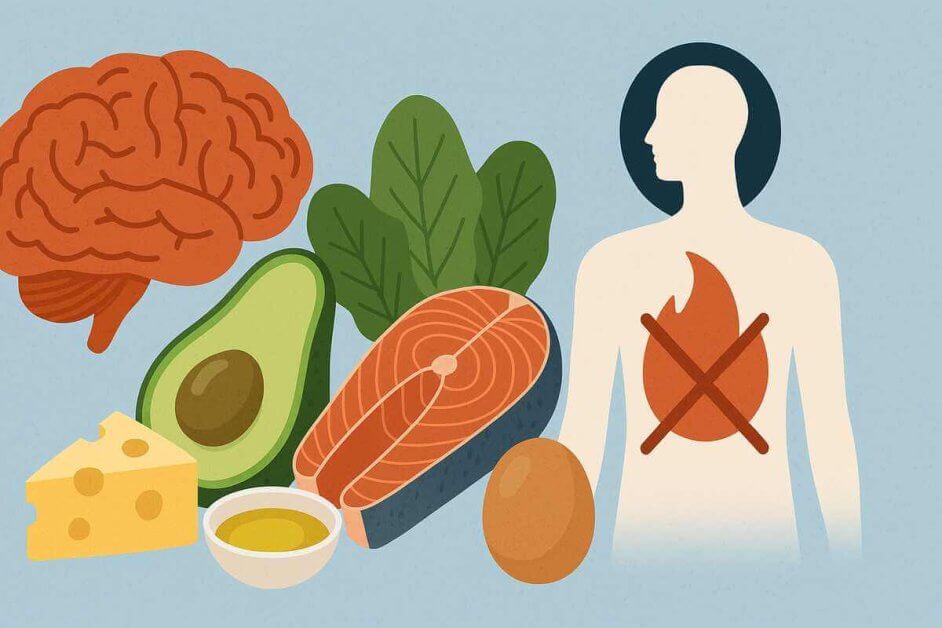
Discover what is the ketogenic diet — a low-carb, high-fat way of eating that shifts your body into fat-burning, ketone-producing mode.
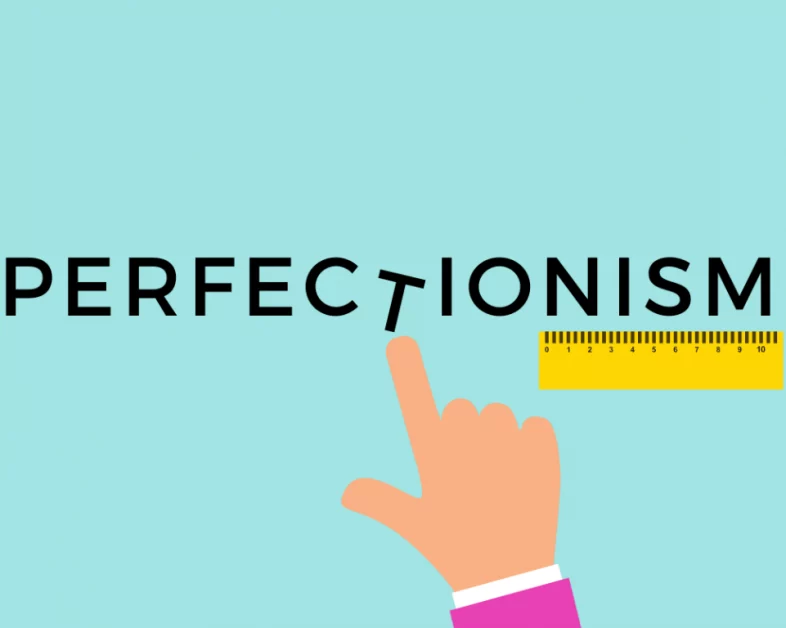
Perfectionists may be known for their high standards and attention to detail, but perfectionism is the enemy of productivity. It also causes much stress and anxiety.

If you are not learning, you’re not earning. This guide to personal development will provide the knowledge and tools to take you to the next level.

By resetting dopamine levels back to healthy baseline levels, we can boost cognitive performance and improve mental health.
© 2025 Modern Mind Masters - All Rights Reserved
You’ll Learn:
Effective Immediately: 5 Powerful Changes Now, To Improve Your Life Tomorrow.
Click the purple button and we’ll email you your free copy.